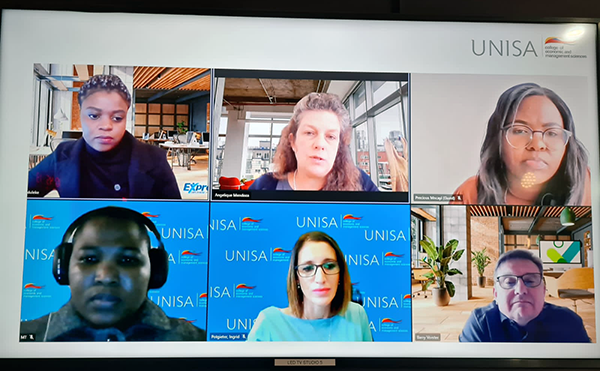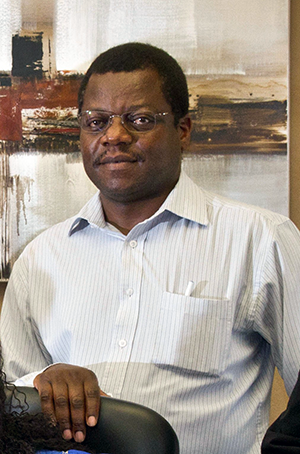College of Economic & Management Sciences
The job mismatch

Top: Tintswalo Maluleke (Express Employment Professionals), Angelique Mendoza (Express Employment Professionals), Dr Precious Mncayi (NWU), and bottom: Dr Mantepu MaseTshaba (CoD: Decision Sciences, CEMS), Prof Professor Ingrid Potgieter (Human Resource Management, CEMS), and Barry Vorster, Chief Strategy Officer at VSLS Human Capital Consulting.
Even though only 9,3% of graduates were unemployed in the first quarter of 2021, not all graduates enjoyed an added advantage in the labour market, Dr Precious Mncayi from the North-West University (NWU) said at a public lecture, The job mismatch, hosted by Unisa’s College of Economic and Management Sciences (CEMS) last month. Mncayi conducted research for her doctoral studies on the mismatch between graduates’ perceptions of the job market and the expectations of employers.
Mncayi pointed out that the 2019 Mission talent—Mass uniqueness: A global challenge for one billion workers report indicated that South Africa had the largest share of mismatched workers with skills mismatches of more than 50% and the lowest productivity levels compared to 30 other countries, which included India and Russia.
Her research revealed that the most important factors affecting graduate unemployment are qualifications and majors held by graduates, which seem not to be aligned with labour market requirements. She argued that students seem to be graduating in courses/study fields that do not directly prepare them for a profession as they opt for generic courses that are associated with smaller chances of finding employment.
Qualifications do not support economic growth
The country is producing an oversupply of graduates in skills that do not support economic growth and employment opportunities created in those sectors are unable to absorb all those graduates. At the same time, employers are finding it hard to find skilled workers, while where more jobs are being created, they are elementary positions, according to Mncayi.
The highest concentration of graduates in the unemployed category had a humanities degree (46,2%), followed by those with a degree in commerce (42,3%). Education graduates comprise 7,7% and sciences 3,8%. Graduates in fields with a more professional focus (e.g., health science, accounting education) found employment more rapidly than others, she said.
Some 82,6% of the sampled graduates were employed, but 45% considered themselves to be underemployed. Approximately 58,5% considered themselves to be underemployed in terms of skills. This was defined as those who perceived themselves to be in jobs where they were overqualified.
A lack of career guidance
Of those that were underemployed, regardless of the type of employment, 63,4% had not received any form of career guidance. This increased the probabilities of being underemployed. Mncayi argued that more could be done to ensure that students receive good career guidance. This included that curriculum designers (institutions of higher learning) needed to pay enough attention to the relevance of the skills and competencies attained by students to assist with their employment prospects after graduation. In addition, government additionally needs to do constant monitoring of existing policies to determine their effectiveness and whether they are achieving their set objectives.
There could be more employed young workers who are in “dead-end” jobs living in poverty than there are unemployed ones, Mncayi warned.
What the panellists said
- A study by the Bureau of Market Research with the college showed that while students regard the credibility of the Unisa CEMS qualification as being important for their employability, it was less important to employers than their work readiness, professionalism and work experience, Professor Ingrid Potgieter of the Department of Human Resource Management and one of the researchers, said. Employers generally assumed that Unisa CEMS qualifications are of quality and credible. This is, however, not a differentiating factor for employing graduates.
A degree doesn’t guarantee a job. The graduate must bring more to the table. Just because you have a degree in management doesn’t mean you are a manager. Someone with a degree in marketing management might even have to start on a lower level in the human resource department. While there are things universities can do to prepare students for the workplace, graduates also have a responsibility to educate themselves.
- According to Statistics South Africa, part-time employment opportunities have increased by 5,3%, Tintswalo Maluleke of Express Employment Professionals pointed out. This is because businesses find it easier to manage variable costs during difficult economic times. While students often shun part-time jobs, it can help them gain valuable work experience. At the same time, they get bottom-up business exposure and they can discover their passions and purpose.
- Angelique Mendoza of Express Employment Professionals indicated that part-time jobs could help students gain experience that will help them when they graduate. The salary expectations of new graduates are too high. If you are a graduate without experience it takes at least six months to understand the business and much longer to be fully productive. Not many companies can afford to invest the time and money required to develop a recruit into a productive staff member.
- Covid only accelerated the process of the changing job market that was already underway. In advanced economies, 50% of people have jobs outside formal employment as we know it, Barry Vorster, Chief Strategy Officer at VSLS Human Capital Consulting, said. Looking at the skills that will be required in the next 10 to 50 years, South Africa will not be able to produce these. He also argued that people live longer and need to think ahead about what jobs will be around when they get older. The use of data in the workplace has also become more pronounced and employees in all sectors will have to be able to work with data.
Specialisation is important in all sectors of the job market. He referred to OUTsurance as an example. The company is thinking about employing biotechnologists with actuaries to look at problems in insurance from a new perspective. We are moving to a world where more people will deliver a specific service at a specific time.
The pandemic has accelerated change in the job market

Prof Raphael Mpofu (Acting ED: CEMS)
The pandemic has accelerated changes in the ways we are doing business. Companies have automated. The role of the office has changed as 80% of employees are working from home. In his opening address at this second public lecture for 2021 at the college, Professor Raphael Mpofu, acting Executive Dean of CEMS, said that none of us were prepared for this.
During these lectures CEMS aims to open discussions about issues of importance in the public domain. 2021 is the third year that the college is hosting these public lectures. During this time, we have hosted diverse and high-profile speakers such as the Governor of the Reserve Bank, Lesetja Kganyago; the representative of the International Monetary Fund in South Africa, Max Alier; Tony Ehrenreich of Cosatu; Professor Glenda Gray, President and CEO of the SA Medical Research Council; and Dr Jens Weidman, President of the Deutsche Bundesbank and a member of the Governing Council of the European Central Bank, Mpofu said.
*By Ilze Crous, Communication and Marketing Specialist, College of Economic and Management Sciences
Teaser image sourced from maestrosphere1 at Pixabay under a Creative Commons licence.
Publish date: 2021/08/11

 Unisa co-hosts G20 community outreach in the Eastern Cape
Unisa co-hosts G20 community outreach in the Eastern Cape
 Unisans gain membership of prestigious science academies
Unisans gain membership of prestigious science academies
 Advocating for disability transformation through servant leadership
Advocating for disability transformation through servant leadership
 Unisa Press continues to illuminate the publishing space
Unisa Press continues to illuminate the publishing space